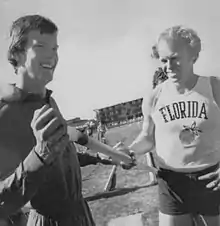 Bell in 1976 | |
| Personal information | |
|---|---|
| Born | August 25, 1955[1] Ancón, Panama[1] |
| Height | 191 cm (6 ft 3 in)[2] |
| Weight | 77 kg (170 lb) |
| Sport | |
| Sport | Athletics |
| Event | Pole vault |
| Club | Arkansas State Indians Pacific Coast Club, Long Beach[2] |
| Coached by | Guy Kochel[3] |
| Achievements and titles | |
| Personal best | 5.87 m (1988)[1][2][4] |
Earl Holmes Bell (born August 25, 1955) is a retired American pole vaulter. He competed at the 1976, 1984 and 1988 Olympics and won a bronze medal in 1984, placing fourth in 1988 and sixth in 1976.
He also briefly held the world record in 1976, and coached several of America's leading vaulters during his retirement years. In 2002, he was inducted into the National Track and Field Hall of Fame.[1]
Biography

Bell was born in Panama to William "Papa" K. Bell and Yola Zimmerman Bell. His father was a medical doctor, a Masters Record Holder pole vaulter,[5] and attended the University of Arkansas. The family moved from Panama to Jonesboro, Arkansas in 1960.
In 1973, Bell entered Arkansas State University. He graduated in 1988 with a BSc degree in accounting.[3] While attending Arkansas State, Bell won the NCAA title in 1975–77. He also won the AAU championships in 1976 and 1984, placing third in 1981. In addition to participating in the Olympics, Bell won a gold medal at the 1975 Pan American Games and finished fifth in 1991.[2]
Bell came to the 1976 U.S. Olympic Trials as the world record holder. At the trials, he lent his pole to David Roberts, who broke his pole. Roberts won the trials with a new world record,[6] and placed third at the Olympics, while Bell finished second and sixth, respectively.[2]
Coaching career
After retiring from competitions Bell established Bell Athletics outside of Jonesboro, where he coached Jeff Hartwig, Derek Miles, Kellie Suttle, Daniel Ryland, and Jillian Schwartz, among other top pole vaulters.[1][7]
Bell is married and has three children: Drew, Sam, and Henry.[3]
Rankings
Rare among vaulters, Bell managed to stay relatively healthy and productive for a long career, gaining US rankings among the best for 16 consecutive years in the Track and Field News annual rankings.[8]
| Year | Event | World ranking | US ranking |
|---|---|---|---|
| 1975 | Pole vault | 3rd | 1st |
| 1976 | Pole vault | 4th | 2nd |
| 1977 | Pole vault | 4th | 2nd |
| 1978 | Pole vault | – | 5th |
| 1979 | Pole vault | – | 5th |
| 1980 | Pole vault | – | 6th |
| 1981 | Pole vault | 6th | 1st |
| 1982 | Pole vault | – | 4th |
| 1983 | Pole vault | – | 3rd |
| 1984 | Pole vault | 7th | 2nd |
| 1985 | Pole vault | – | 4th |
| 1986 | Pole vault | 5th | 1st |
| 1987 | Pole vault | 3rd | 1st |
| 1988 | Pole vault | 5th | 2nd |
| 1989 | Pole vault | – | 5th |
| 1990 | Pole vault | – | 3rd |
References
- 1 2 3 4 5 "Earl Bell". usatf.org.
- 1 2 3 4 5 Evans, Hilary; Gjerde, Arild; Heijmans, Jeroen; Mallon, Bill; et al. "Earl Bell". Olympics at Sports-Reference.com. Sports Reference LLC. Archived from the original on April 17, 2020.
- 1 2 3
- ↑ "Earl Bell". trackfield.brinkster.net.
- ↑ Masters Athletics Pole Vault Rankings. Retrieved November 4, 2020
- ↑ Putnam, Pat. "FLYING START TOWARD THE OLYMPICS". Sports Illustrated Vault | SI.com. Retrieved December 8, 2023.
- ↑ Earl Bell. bellathletics.com
- ↑ World Rankings Index — Men’s Pole Vault. Track and Field News
